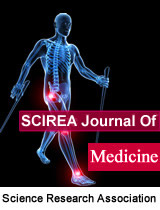Psychotic Illness: A trial of maintenance ECT
DOI: 10.54647/pm310252 41 Downloads 50542 Views
Author(s)
Abstract
Schizophrenia is an enduring psychiatric illness that is classed as a type of psychosis and typically presents with a combination of hallucinations, delusions, disordered thinking, and behaviour which results in functional impairment 10.
The National Institute for Health and Care Excellence (NICE) recommends that individuals diagnosed with Schizophrenia should be offered antipsychotic medication along with psychosocial interventions 8. Other treatment modalities in the management of Schizophrenia have been used including Electroconvulsive therapy (ECT) 4.
In this case report, we present a lady with schizophrenia who is well-known to the mental health services. The nature of her illness is chronic, spanning several decades, and over the years, she has either had a suboptimal response or developed significant side effects/adverse reactions, including dystonic reactions and two episodes of Neuroleptic Malignant Syndrome. As a result, she has mostly received maintenance Electroconvulsive Therapy (ECT) for the past 5 years.
Keywords
maintenance ECT, Schizophrenia, ECT
Cite this paper
Athar Abbas, James Rand, Mehraj Shah,
Psychotic Illness: A trial of maintenance ECT
, SCIREA Journal of Medicine.
Volume 8, Issue 1, February 2024 | PP. 18-27.
10.54647/pm310252
References
| [ 1 ] | Chanpattana, W. and Sackeïm, H.A. (2010b) 'Electroconvulsive therapy in Treatment-Resistant Schizophrenia,' Journal of ECT, 26(4), pp. 289–298. |
| [ 2 ] | Ferrier, I.N. and Waite, J. (2019c) The ECT handbook. Cambridge University Press. |
| [ 3 ] | Fink, M. (1979) Convulsive therapy : theory and practice. Raven Press. |
| [ 4 ] | Janicak, P.G. et al. (1985b) 'Efficacy of ECT: a meta-analysis,' American Journal of Psychiatry, 142(3), pp. 297- 302. |
| [ 5 ] | Kane, J.M. et al. (2019b) 'Clinical Guidance on the identification and Management of Treatment-Resistant Schizophrenia,' The Journal of Clinical Psychiatry, 80(2). |
| [ 6 ] | Lévy-Rueff, M. et al. (2008) 'Place de l’électroconvulsivothérapie de maintenance dans le traitement des schizophrénies résistantes,' [Maintenance electroconvulsive therapy and treatment of refractory schizophrenia] L’Encéphale, 34(5), pp. 526–533. |
| [ 7 ] | NICE (2003b) 1 Guidance | Guidance on the use of electroconvulsive therapy | Guidance | NICE. https://www.nice.org.uk/guidance/ta59/chapter/1-Guidance. |
| [ 8 ] | NICE (2014) Recommendations | Psychosis and schizophrenia in adults: prevention and management | Guidance | NICE. https://www.nice.org.uk/guidance/cg178/chapter/Recommendations#subsequent-acute-episodes-of-psychosis-or-schizophrenia-and-referral-in-crisis-2. |
| [ 9 ] | Schizophrenia | Royal College of Psychiatrists (2015). https://www.rcpsych.ac.uk/mental-health/mental-illnesses-and-mental-health-problems/schizophrenia. |
| [ 10 ] | Schizophrenia - Symptoms and causes - Mayo Clinic (2020b). https://www.mayoclinic.org/diseases-conditions/schizophrenia/symptoms-causes/syc-20354443. |
| [ 11 ] | Tharyan, P. and Adams, C.E. (2005) 'Electroconvulsive therapy for schizophrenia,' The Cochrane Library [Preprint]. |
| [ 12 ] | Verwijk, E. et al. (2017) Dokter, komt mijn geheugen terug? Elektroconvulsietherapie en cognitieve bijwerkingen in de praktijk. [Doctor, will I get my memory back? Electroconvulsive therapy and cognitive side-effects in daily practice]. Tijdschrift voor |

